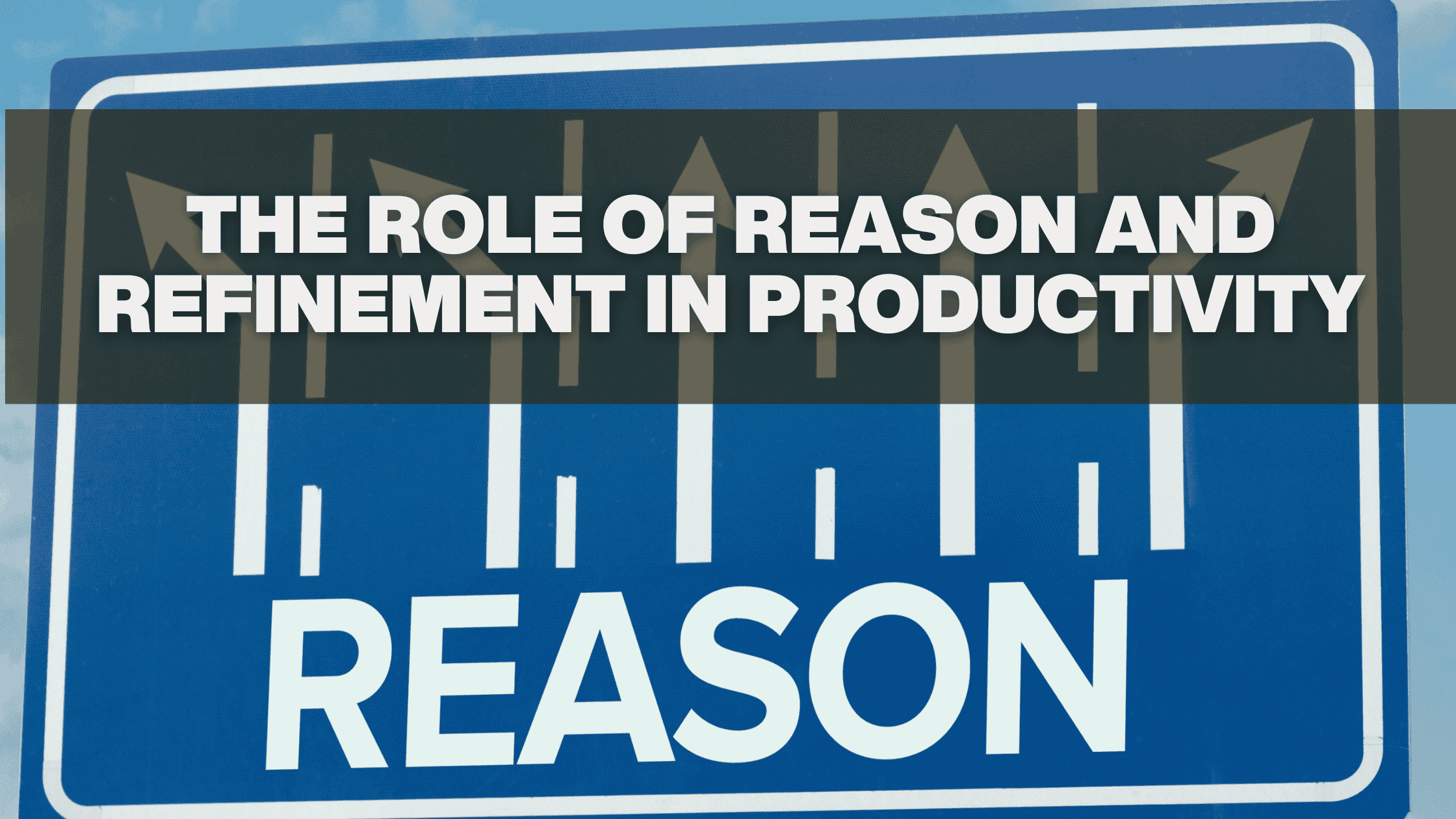
In the pursuit of being truly productive, aligning one’s cognitive strategies and habits with the natural rhythm of the body clock isn’t just wise; it’s a necessity. This alignment requires a blend of two often overlooked and yet pivotal elements in the productivity equation: Reason and Refinement.
The Power of Reason in Guiding Productivity
Reason, in its purest form, is the ability to apply logical and critical thinking to our actions and decisions. The Greek philosopher Aristotle famously stated, “We are what we repeatedly do. Excellence, then, is not an act, but a habit.” This sentiment underscores the importance of reasoned decision-making in forming productive habits.
In the context of time management, reason becomes the compass that guides us to discern when we are most mentally alert and physically active. By understanding and respecting these peaks and troughs in our energy levels we can schedule tasks in harmony with our circadian rhythms, leading to increased efficiency and reduced fatigue.
Research in chronobiology, the science of natural physiological rhythms, supports this approach. Studies have shown that aligning work tasks with one’s internal clock can enhance cognitive function and productivity (Foster & Kreitzman, 2004). By using reason to recognize and respect these biological rhythms, individuals can optimize their schedule for peak productivity.
A Quick Exercise on Reason (Inspired by Ben Kirk): The ‘Three Why’s’ Approach
- Objective: To deepen understanding and reasoning behind each task.
- Implementation: Before starting a task, ask yourself “Why” three times to get to the core purpose of the task.
- Example:
- Task: Prepare a presentation.
- Why #1: To inform my team about the project’s progress.
- Why #2: To ensure everyone understands their role and next steps.
- Why #3: To enhance team collaboration and project success.
- Impact: This exercise, inspired by Ben Kirk’s focus on overcoming obstacles, helps clarify the purpose behind tasks, ensuring they align with larger goals.
Refinement: The Art of Continuous Improvement
Refinement, or the process of making small adjustments to improve efficiency and effectiveness, is akin to the Japanese concept of ‘Kaizen,’ which translates to ‘continuous improvement.’ This practice, deeply rooted in Japanese business culture, emphasizes the value of iterative, incremental changes in processes, reflecting a commitment to refinement in pursuit of excellence.
Applying refinement to productivity involves a constant reevaluation and optimization of how one manages time and tasks. It’s a process of trial and error, requiring patience and persistence. As Thomas Edison said, “I have not failed. I’ve just found 10,000 ways that won’t work.” His relentless pursuit of refinement led to groundbreaking inventions that reshaped the world.
A Quick Exercise on Refinement (Guided by Francesco D’Alessio’s Insights): App Efficiency Audit
- Objective: To refine the use of productivity tools.
- Implementation: Review the apps and tools you use for work.
- Steps:
- List all productivity apps you currently use.
- For each app, note how it contributes to your productivity.
- Identify any overlaps or redundancies.
- Decide which apps to keep, replace, or remove.
- Impact: Francesco D’Alessio’s expertise in productivity apps emphasizes the importance of using the right tools. This exercise helps streamline your toolkit, enhancing overall efficiency.
Aligning Body Clock and Work Habits
The concept of aligning one’s body clock with work habits is a vivid example of the interplay between reason and refinement. By using reason to understand one’s natural rhythms and then refining work schedules and habits accordingly, individuals can work with (rather than against) their physiological makeup.
Recent research in sleep science and chronobiology suggests that working against one’s natural body clock can lead to reduced cognitive function and even health issues (Walker, 2017). On the contrary, aligning work habits with the body clock can lead to more efficient, meaningful, and enjoyable work.
A Quick Exercise on Alignment: The ‘Best Time’ Experiment
- Objective: To find the optimal time for different types of tasks.
- Implementation: Experiment with scheduling various tasks at different times.
- Steps:
- Identify tasks that require high focus and those that are less demanding.
- Schedule high-focus tasks during your identified high-energy times (from the Energy Tracking exercise).
- Schedule less demanding tasks during your lower energy periods.
- Adjust based on your observations over a week.
- Impact: This exercise encourages aligning tasks with your natural energy cycles, optimizing productivity and well-being.
The Long-Term Payoff of Reason and Refinement
The integration of reason and refinement in managing one’s relationship with time is a powerful approach to achieving sustained productivity. It’s not about working more hours, but working smarter within the hours that are most conducive to one’s internal clock.
By embracing the wisdom of reason and the art of refinement individuals can transform their productivity, aligning it with the natural rhythms of their bodies and minds. This approach not only enhances immediate output but also ensures long-term well-being and success.

